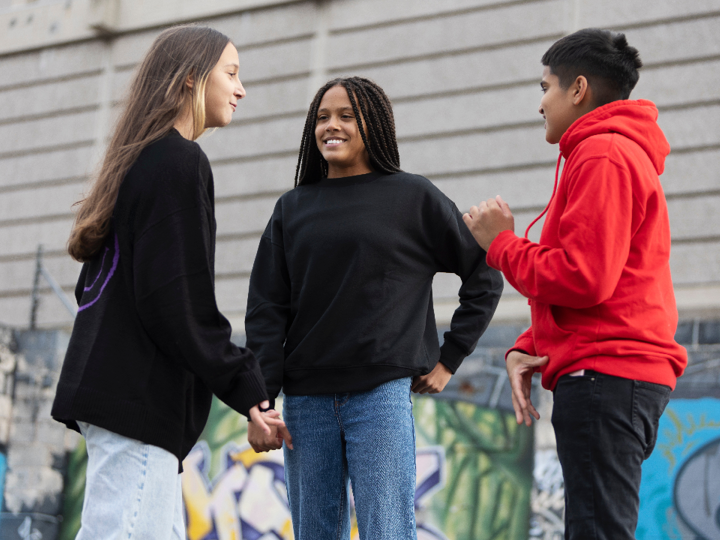Hormones, puberty and sexuality
- 11-19 Years
- SEND
- Child development and growing up

As your child grows older, their body will start to develop and change. This is known as puberty. Puberty usually starts anywhere between 8 years and 14 years and can last up to 4 years. Your child may become more emotional during this time. They may start to become more interested in developing romantic relationships with others and questioning their sexuality and gender identity.
Explore the topics in this page:
Signs of puberty
Some signs of puberty for girls include:
- growing pubic hair around armpits and genital areas
- developing breasts
- widening hips
- starting periods (menstruation)
Some signs of puberty for boys include:
- growing pubic hair around armpits and genital areas
- voice ‘breaking’ and becoming permanently deeper
- voice may sometimes switch between being very high or very low
- widening shoulders
- penis and testicle growth
During puberty and teenage years your child’s body will develop larger sweat glands and their skin will start to make more oils. The sweat glands release sweat in response to stress, emotion, and sexual excitement. The increase in sweat can cause body odour and the increase in oils can lead to greasy hair and spots. Read more about hygiene for young people and teenagers.

Periods and menstruation
Periods and menstruation will usually start between the ages of 8 and 14 years. But it is normal for some girls to start earlier or later.
It is safe for your child or young person to exercise when on their period. Sometimes exercising may help to ease the pain experienced around this time of the month. Some young people may feel a decline in energy levels around their period. So moderate intensity exercise such as walking may be preferred.
Concerns about periods and menstruation?
Periods and menstruation can be stressful and worrying for young people.
If your child is concerned about periods or menstruation, they can speak to their school nurse. They can also read more about periods on the Childline website.
Emotions and feelings
Teenagers often feel a rollercoaster of emotions. This is because their brains are still developing. The emotions they are feeling can be intense and overwhelming. This is because they may have not yet developed the tools to handle these emotions and feelings. This can increase moodiness, affect their emotional health and self-confidence.
You are likely to see a range of emotions in your child and expect some different behaviours. Some ways you can manage this is by:
-
- setting clear boundaries around behavioural expectations
- setting clear boundaries around respect within your family/household relationships
- allowing them to be open and honest about their feelings
Read our information on behaviours, emotions and mental health.
As your child's body changes, your child may be more self-conscious and worried about the way they look. Let your child talk about these thoughts and feelings. Try to comfort them whilst recognising their feelings.
Your child may also want to spend more time alone in their own private space. Allow your child to have space to be alone and be respectful of their right to privacy.
A lot of things will change throughout puberty. You may find your child develops different interests and hobbies. The things they enjoy may change.
The relationship between you and your child may change and develop. This will also happen with their teachers and other adults. Try to encourage your child to talk to a trusted adult about the changes their feeling and their worries.

Sex, sexuality and gender identity
Your child may become more interested in developing romantic relationships with others and questioning their sexuality and gender identity. This is a completely normal part of their development. It is important to try to keep an open mind and be non-judgemental as they express their thoughts.

You can find out extra information on gender identities and sexuality below:
- Think your child might be trans or non-binary - NHS UK
- Parents guide to support gender identity issues - YoungMinds
- Coming out - Advice and guidance for parents - Stonewall Scotland
It is normal for teenagers to become interested in sex and relationships.
Your child will receive Relationships and Sex Education (RSE) throughout secondary school. This will include information about:
- healthy relationships
- puberty
- sex and contraception
- consent
- safety and the law
Read more about what is covered during RSE on the government website.
Last reviewed: 1 November, 2023
